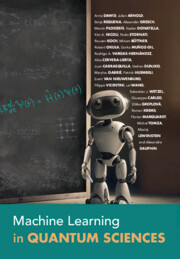Book contents
- Frontmatter
- Dedication
- Contents
- Contributors
- Preface
- Acknowledgments
- Note on the text
- Abbreviations
- 1 Introduction
- 2 Basics of machine learning
- 3 Phase classification
- 4 Gaussian processes and other kernel methods
- 5 Neural-network quantum states
- 6 Reinforcement learning
- 7 Deep learning for quantum sciences: Selected topics
- 8 Physics for deep learning
- 9 Conclusion and outlook
- A Mathematical details on principal component analysis
- B Derivation of the kernel trick
- C Choosing the kernel matrix as the covariance matrix for a Gaussian process
- References
- Index
4 - Gaussian processes and other kernel methods
Published online by Cambridge University Press: 13 June 2025
- Frontmatter
- Dedication
- Contents
- Contributors
- Preface
- Acknowledgments
- Note on the text
- Abbreviations
- 1 Introduction
- 2 Basics of machine learning
- 3 Phase classification
- 4 Gaussian processes and other kernel methods
- 5 Neural-network quantum states
- 6 Reinforcement learning
- 7 Deep learning for quantum sciences: Selected topics
- 8 Physics for deep learning
- 9 Conclusion and outlook
- A Mathematical details on principal component analysis
- B Derivation of the kernel trick
- C Choosing the kernel matrix as the covariance matrix for a Gaussian process
- References
- Index
Summary
The theory of kernels offers a rich mathematical framework for the archetypical tasks of classification and regression. Its core insight consists of the representer theorem that asserts that an unknown target function underlying a dataset can be represented by a finite sum of evaluations of a singular function, the so-called kernel function. Together with the infamous kernel trick that provides a practical way of incorporating such a kernel function into a machine learning method, a plethora of algorithms can be made more versatile. This chapter first introduces the mathematical foundations required for understanding the distinguished role of the kernel function and its consequence in terms of the representer theorem. Afterwards, we show how selected popular algorithms, including Gaussian processes, can be promoted to their kernel variant. In addition, several ideas on how to construct suitable kernel functions are provided, before demonstrating the power of kernel methods in the context of quantum (chemistry) problems.
Keywords
Information
- Type
- Chapter
- Information
- Machine Learning in Quantum Sciences , pp. 76 - 110Publisher: Cambridge University PressPrint publication year: 2025
Accessibility standard: Unknown
Why this information is here
This section outlines the accessibility features of this content - including support for screen readers, full keyboard navigation and high-contrast display options. This may not be relevant for you.Accessibility Information
- 9
- Cited by
